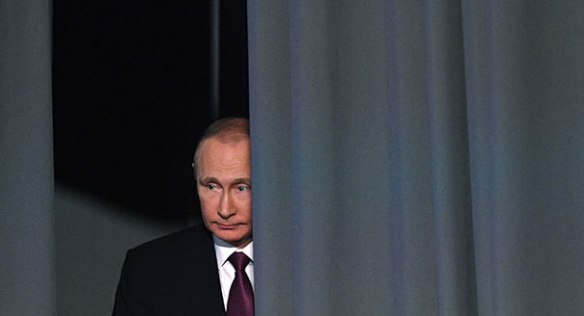
People are all excited about the investigation, now led by special council Robert Meuller. Did the Trump campaign collude secretly with the enemy? That would be high treason. Frankly, I was extremely skeptical . It seemed that this was nothing more than another political sideshow, but, as Douglas Blackmon reports: “This scandal has metastasized more quickly and destructively than I could possibly have forecast.”
There is nothing surprising about Russians doing what they could in the American election. Both Russia and America have been meddling in the internal affairs of other nations for decades. Sometimes, the United States, contrary to the lofty principles of our founding fathers, has helped overthrow popularly elected governments in favor of those willing to support our military or business interests. Khrushchev claimed to have had a small but perhaps decisive effect on the election of Kennedy over Nixon in 1960. In 1984, Russia tried in vain to help defeat Ronald Reagan, but he won in a landslide. So, Russia meddling in our affairs is not new. However, this time, as explained by Eugene Rumor in testimony before the U.S. Senate Select Committee on Intelligence,
The experience of Russian meddling in the 2016 U.S. election should be judged an unqualified success for the Kremlin.
Since the turn of the millennium, Russia has morphed into a more and more authoritarian kleptocracy. As in the Soviet days, it sees democracy as the enemy. To combat this enemy, it has developed an impressive arsenal of political weapons, called “active measures”. Some of these, such as assassination, are truly frightening. However, most target the public’s ability to determine what is true. As historian Timothy Snyder says:

Timothy Snyder
So if you want to rip the heart out of a democracy directly, if you want to go right at it and kill it, what you do is you go after facts.
Thus, the first line of defense against these active measures is good journalism. Throughout the previous century, America had a vibrant core of reliable news sources dedicated to providing the public with a firm foundation for making informed decisions. Of course, we also had the National Enquirer, but its wild fabrications were pretty harmless in the context of the whole information scene.
However, new technologies have disrupted the news business, fragmenting it and undermining its traditional business model. Newspapers are reducing their staff or closing all together, and new sources of information are gaining prominence. Some are excellent, but many publish wild distortions and outright lies. With our information infrastructure weakened, fake news is no longer so harmless. Our society has become more susceptible to disinformation campaigns.
Clearly, the Russians aren’t the only ones engaged in such campaigns. With its denial of climate change and thinly veiled bigotry, the “conservative entertainment-outrage complex” has been peddling misinformation, willful ignorance, and bizarre conspiracy theories for years. Pundits have found it lucrative to provoke outrage with purposely misleading or blatantly false assertions. The Republican Party, after discovering how well these techniques worked, got on board this plush, well-funded train and lurched ever more towards the reactionary right to appease the loudest voices in the crowd.
Having largely abandoned thoughtful and reasoned debate, the party found itself helpless in the face of a hostile takeover by a showman brandishing even more brazen bigotry, more outlandish conspiracy theories, and an almost complete detachment from reality. Trump dominated the 2016 field in the primaries, effortlessly sloughing off all attacks. The fact checkers declared “pants on fire”. Big deal. They were always making noise about something. Trump’s proposals were unrealistic and impractical. So what? Almost all of the Republican proposals were. Trump could say something that qualified as “the textbook definition of a racist comment,” but the party base didn’t care. They were tired of all this “politically correct” pussyfooting around. They wanted someone who would tell it like it is, and Trump delivered. Thus, the Trump phenomenon sprouted out of ground that had been richly fertilized with fake news and manufactured outrage for many years. Trump is a symptom, not the root cause, of the disease affecting our democracy.
We have the remedy to this disease in hand: multiple reliable sources of accurate information. However, there is a core of Americans who have developed resistance to this remedy.

@real@realDonaldTrump
Trump, recognizing the threat that good journalism poses to him and what he represents, lashes out at the press whenever he can. In one case, he tweeted
The FAKE NEWS media (failing @nytimes, @NBCNews, @ABC, @CBS, @CNN) is not my enemy, it is the enemy of the American People!”
In truth, it is pretty easy to see why he is so upset with the mainstream media. A Harvard study has shown that the coverage Trump received in the first 100 days was much more negative than for other presidents. Almost every day, the Washington Post calls out something that he said as demonstrably false, or at least inconsistent with what he said earlier. Almost all of the newspapers in the country endorsed Hillary Clinton. To someone who supported Trump in the election, it must all seem pretty one-sided. However, these reliable news sources rejected Trump for a good reason: he is manifestly deceitful and unqualified. How can you provide fair and balanced coverage of a man who lies so persistently?
I actually agree with Trump about the significance of fake news; I disagree with him about which news is fake. And the phrase “enemy of the people” has a frightening pedigree, particularly as used by Stalin during the purges. This is all a part of a calculated strategy, one pulled directly from the fascists in the 1920s and 30s, that Timothy Snyder describes it this way:
Step one: You lie yourself, all the time. Step two: You say it’s your opponents and the journalists who lie. Step three: Everyone looks around and says, “What is truth? There is no truth.”
And then, resistance is impossible, and the game is over.
Trump has praised Stalin’s heir, Putin, for the strength of his leadership and for his high approval rating. Of course, Putin, like Stalin before him, assures the security of his regime and his high approval ratings by systematically suppressing dissent and controlling the press.
Trump seems envious of Putin’s power, unfettered by that pesky Constitution. In his recent trip, Trump appeared much more at home with the Saudi monarch than with the leaders of European democracies.
During the campaign, I was continually mystified by Trump’s praise of Putin and by the presence of aids in his campaign with known ties to Russia. Trump even asked for the Russia’s help getting at Clinton’s emails n a nationally televised debate. (Though he wasn’t referring specifically to the emails at the DNC, I imagine he was pleased enough at what he got.) How did the party of Reagan and Eisenhower ever get to the point that they acquiesce to such as this?
Even so, I had trouble believing that there was actual collusion between the Trump campaign and Russia, not because I believed Trump when he claimed there was none, but because it was so unnecessary. The Trump campaign meshed naturally, publicly, with what the Russians were trying to do. No behind-the-scenes coordination was needed.

Robert Meuller
So, what will Meuller find when he looks into Russia’s meddling in our election? Probably, he will confirm much that we already know.
Clearly, someone hacked into the Democratic National Committee’s server and leaked a boatload of emails to WikiLeaks. The intelligence agencies claim to have established that this was done by Russians, apparently under the authority of Putin himself. However, given the DNC’s rather cavalier in its approach to security, I’m not surprised someone broke in.
The Russians probably funneled money to the campaign of Donald Trump, perhaps also to Bernie Sanders, through some front organizations. They used dummy accounts to promote certain stories on the web that might otherwise have been ignored. They might have added a bit to the fake news, but there was so much of that I hardly see why they would have bothered. In general, I expect the Russians amplified the havoc, but they certainly didn’t create it.
It might be that Trump or one of his functionaries was dumb enough to step over the line and do something that would justify prosecution in a court of law. Certainly, people in the Trump entourage, i.e. Paul Manifort and Michael Flynn, had financial ties to some unsavory Russian characters. It appears that Trump has attempted to interfere with the investigations, and there might be something in the cover up that was illegal. You would think Trump would have learned enough from Nixon in the Watergate scandal to avoid this, but Trump occasionally shown himself to be phenomenally brash and ignorant.
In summary, Russia’s political tools are sophisticated and their motives are sinister. We need to understand what they are up to and how to combat them. But while we concern ourselves with the active measures of foreign governments, we also need to pay attention to the attack on truth from within our own country. This actually poses the bigger threat to our democracy.
And subscribe to a good newspaper. We need them.

I posted this shortly after the Meuller investigation began. Re-reading it now, it is still relevant. It contains a couple of points:
1) Covert collusion was simply unnecessary: the aims of our Russian enemies were, for the most part, indistinguishable from the aims of the Trump campaign.
2) Our main defense against those who would subvert our democracy is a vibrant corps of journalists dedicated to providing reliable information.
LikeLike